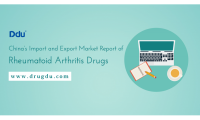-
FT
- Source: drugdu
- 519
- March 24, 2023
-
England’s NICE signs off on PTC Therapeutics’ $3.7M gene therapy for ultra-rare disease
- Source: drugdu
- 146
- March 24, 2023
-
An overview of COVID-19-associated neurological complications in children
- Source: drugdu
- 298
- March 15, 2023
-
China’s Import and Export Market Report of Rheumatoid Arthritis Drugs
- Source: Ddu
- 3,945
- August 26, 2021
-
Pfizer’s JAK inhibitor Xeljanz shows benefit in COVID-19 pneumonia
- Source: drugdu
- 993
- August 25, 2021
-
Janssen inks inflammatory disease collaboration with Mestag Therapeutics
- Source: drugdu
- 250
- May 19, 2021
-
GW Pharma’s Epidyolex scores new EU indication
- Source: drugdu
- 234
- April 21, 2021
-
Novartis bags EU, UK licences for MS therapy Kesimpta
- Source: drugdu
- 161
- April 8, 2021
-
Novo Nordisk’s Sogroya moves closer towards EU approval
- Source: drugdu
- 261
- February 5, 2021
-
EU approves Chiesi’s triple combination asthma therapy Trimbow
- Source: drugdu
- 216
- February 3, 2021
your submission has already been received.
OK
Subscribe
Please enter a valid Email address!
Submit
The most relevant industry news & insight will be sent to you every two weeks.













